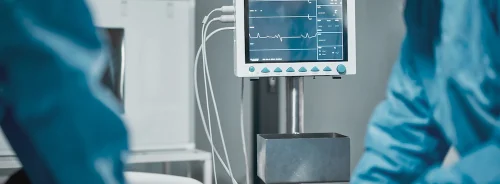ICU Management & Practice, ICU Volume 11 - Issue 4 - Winter 2011/2012
At the present moment, intensive care medicine is not yet identified as an independent specialty in Bulgaria, but considered as an integral part of anaesthesiology. Thus, traditionally every anaesthesiologist in Bulgaria is classed as "a specialist in anaesthesiology and intensive care medicine". In the majority of clinics, anaesthesiologists alternate their work in the operating room with ICU shifts. Their duties in the ICU last 12 hours (day shift and night shift) and in the operating theatre, their working day lasts seven hours. In some ICUs, internal medicine physicians participate more than cardiologists, working eight hours every day of the week except weekends. Over time they are considered to have specialised in intensive care medicine via clinical practice, without ever passing an obligatory educational course. This is but one of the many challenges facing intensivists in Bulgaria, which I will outline in this article.
Our Two Largest ICU Centres
The organisation of modern day ICU centres is as follows. The most highly specialised and best-equipped ICUs are in the MMA Sofia and in the Pirogoff hospital. The biggest centre of emergency medicine in Bulgaria (the Pirogoff hospital) is also known for its role as an educational base for the medical academy. It features a specialised burns treatment centre, where patients suffering from extensive burns are treated, and which includes two surgical departments and an ICU department, which employs an anaesthesiologist specialised in treating burns victims.
Over the last 10 years, the ICU department in the Military Medical Academy (MMA) in Sofia has become the leading centre in the field of intensive care medicine. Its patients mainly suffer from severe polytrauma, severe craniocerebral trauma, severe gunshot and explosion trauma and come from across the country. In this department, anaesthesiologists as well as internal medicine physicians specialised in intensive care are employed to treat patients. This ICU has modern equipment as well as the possibility to provide rapid consultations with leading specialists from other specialties, if necessary.
In the regional cities in Bulgaria there are, of course, regional hospitals. Each has an ICU, whose patients come mainly after emergency or elective surgery. Most of these hospitals are not sufficiently funded. When they get patients needing very expensive treatment, they call for help to the most proximate university hospital. There are five university hospitals in Bulgaria – in Sofia, Plovdiv, Varna, Stara Zagora and Pleven. The MMA Sofia and the ICU in the Pirogoff hospital receive the most severely ill patients from across the country. The transport of patients is carried out by a so-called "reanimobile" or less frequently, by helicopter. As a general rule, paediatric, neonatal patients and patients with extensive burns are stabilised in the closest regional or university hospital, before being transported to the capital where they are treated in a specialised clinic in either the Pirigoff hospital or the MMA Sofia.
Challenges for Funding of ICU Care
During a period of socialism in Bulgaria, between 1950 and 1998, and a little after that, medical assistance was free for all citizens, and its value was covered by the state budget. In 1999, a national health insurance fund (NHIF) was set up. NHIF is an independent institution, which is not a division of the Ministry of Health. It is funded by the employee health insurance and is at the moment mandatory for all workers. Students and retirees, on the other hand, have their health insurances paid for by the Ministry of Health. If the patient has no health insurance, they must pay for their entire treatment. The NHIF is set up so that reimbursements are made according to clinical pathways, which refers to the sum of all clinical and laboratory investigations and all therapeutic measures. Most of the clinical pathways are not sufficiently funded and the patient must therefore pay for certain extra elements, for example, prosthetic devices such as heart valves, hip/knee joints, etc, kits for laparoscopic surgery and stents for angioplasty. In the last few years, private health insurance funds are gaining in popularity as a means to address this insufficiency. Usually they have a contract with some big public or private hospital. If their client chooses this hospital, they refund expenses not covered by the clinical pathway.
Most elderly and critical patients suffer different conditions at the same time. Unfortunately, according the rules of NHIF, the patient can be reimbursed for treatment of only one individual illness. This creates an obstacle for financing in the ICU, because all patients need complex medical care and different investigations. This problem has been solved partially by the Ministry of Health for co-funding of ICUs by allocating financial aid depending on the number of healed patients per individual ICU department. However, even this is usually insufficient. Hospital managers and ICU chiefs have to seek ways for internal redistribution of the hospital's budget to cover the extra expenses. Therefore, the majority of hospitals maintain only a minimum number of beds in the ICU, otherwise they accumulate a large debt. If the patient recovers in a private hospital, they must cover the extra cost on their own.
The health ministry is working on the implementation of diagnostic related groups (DRGs) as a much needed financial strategy for the country. The main principle is that each clinic or department will receive a payment per performed activity (pay for performance), rather than per treatment pathway. The Ministry hopes that this system will solve the problems regarding reimbursement of expensive treatments.
Emergency Care
Emergency care is, naturally, free for all citizens, financed by the Ministry of Health. Each hospital is obliged to provide emergency care for patients or victims, and emergency departments located in the regional and university hospitals are charged with this duty. National emergency centres are set up in the Pirigoff hospital and MMA Sofia. Citizens may request an ambulance via a local emergency phone number but also on the European emergency number, 112. This is a free service across the country. In the emergency department physicians specialised in emergency medicine or anaesthesiology and intensive care are employed to treat patients.
Challenges for Education
In Bulgaria, to achieve qualification in anaesthesiology and intensive care one must complete a four-year course. The candidates then take part in a competition and those who succeed attain residency in a university clinic. The government finances part of these residencies, another small part is paid by the residents themselves. All residents have individual educational programmes. In terms of their education, they must pass different courses, including those held in leading intensive care departments across the country. Educational courses organised by different European and world associations are not mandatory. If someone wants to pass them, they must cover the expenses themselves. Every six months, a commission of lecturers from the same department examines the residents, who must pass an exam that covers a defined part of the anaesthesiology and intensive care curriculum. The specialty qualification in anaesthesiology and intensive care is obtained after passing state exams before a committee chosen by the Ministry of Health, consisting of the headmasters of leading ICU departments in Bulgaria.
One of the current and more serious challenges for education is that each physician who acquires a general qualification in anaesthesiology and intensive care has the right to practice many subspecialised anaesthesia techniques without being obliged to follow courses to attain accreditation in a subspecialty, for example paediatric anaesthesia, obstetric anaesthesia, cardioanaesthesia, etc. This obviously, has worrying consequences for the provision of high quality care in the country. Instead of obligatory education, our system relies on continuing practice amongst physicians over time as a means of passing down the skills of the older professionals in the department. This is one cause for the large difference in the skill level of physicians in different parts of the country. Therefore, the regular congresses held by the Society of Anaesthesiologists in Bulgaria provide an important way to compare specialist knowledge in anaesthesiology and intensive care, whose aim is to affirm the high standards of the leading clinics in the country.
Challenges for Future Development
Problems with the provision of intensive care in Bulgaria stem, in part, from poor funding. The more severe patients one clinic treats with higher technology and expensive medications, the greater this eats into the allocated budget. The larger services receive dual funding. For example, MMA Sofia cures patients from across the country. Part of its financing is provided by the Ministry of Defense. Another leading intensive care department, the Pirigoff hospital, receives an extra grant from the Ministry of Health. Very often these two centres have a large influx of patients who cannot be matched with available hospital beds and medical personnel in other areas. In all, it is to be hoped that with changes and modernisation to the government and regulation of health services in Bulgaria, this will filter down to the provision of excellent ICU and emergency services to critically ill patients.





